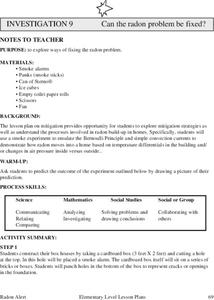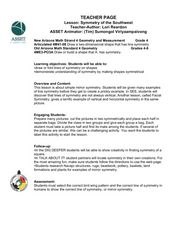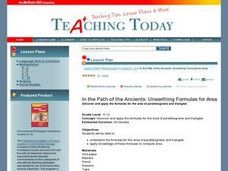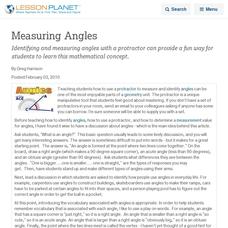Curated OER
Can The Radon Problem Be Fixed?
Students participate in lab activities in which they examine the radon level in homes. They demonstrate through convection currents how radon moves through a home based on temperature. They predict what they believe will occur during the...
Curated OER
Penny's Box
Students need to be able to calculate the volume and surface area of a cuboid as well as present a systematic list of results in order to justify the minimum case. The use of three factors of 100 is also important.
Curated OER
Tiling the Plane
Students use pattern blocks and triangular grid paper to review shape names, be introduced to the concept of a tiling of the plane, and determine which pattern blocks tile the plane. They are asked: "Have you ever seen a floor or a wall...
Curated OER
Awesome Animals
Students collect data from classmates about their favorite animal. They use the ClarisWorks graphing program to enter data, graph results, and interpret data.
Curated OER
Symmetry of the Southwest
Fourth graders examine mirror symmetry. In this symmetry instructional activity, 4th graders discover that symmetry is not always vertical or horizontal. Students cut and fold shapes along lines of symmetry.
Curated OER
TE Activity: Nidy-Gridy
Students make a grid and coordinate system map of their classroom as they investigate why it is important to have a common map making system. They look at how landmarks are used for navigating an area.
Curated OER
Surveying Our Media
Students participate in a lesson that is concerned with the concept of examining the use of media in society. They create surveys to measure the presence of the media in everyday life. The results are collected and represented in the...
Curated OER
Happy the Fish
Students explore the ways in which people's actions affect fish. They discuss pollutants that are in the water. Students define the terms chemicals, cooling pond, and pollutant. They create a book about Happy the Fish.
Curated OER
How Fragile Is an Egg?
Learners design a "container" for his/her egg to determine whether the egg remain intact when dropped from a predetermined height.
Curated OER
Rodeo Round-Up
First graders create a graph of the various teachers' favorite events at the rodeo.
Curated OER
Making Nets for Solids
Third graders are introduced to a variety of two-dimensional shapes. Individually, they are given a cube, cylinder and cone and take apart each shape. While taking them apart, they discuss how the two-dimensional shape was created.
Curated OER
Try An Angle
Fifth graders classify the different triangles by sides and angles. They discover how many different ways they can arrange 2, 3, 4 ...7 tangram pieces to create triangles. They classify and label the six triangles on their pattern sheet.
Curated OER
In the Path of the Ancients: Unearthing Formulas for Area
Students apply the formulas for the area of parallelograms and triangles. Through guided practice, students discover the correct way to apply the formulas. Working in pairs, they write their own problems featuring the formulas.
Curated OER
Having Beary Much Fun with Core Knowledge
Students participate in a teddy bear themed unit to improve their social and reading skills along with other core knowledge subjects. In this social and reading skills lesson, students complete 8 units of activities to learn about social...
Curated OER
Laws of Exponents, Radicals
In this Algebra II worksheet, 11th graders solve problems involving the laws of exponents, including fractional exponents, solve radical equations, and graph radical functions. The ten page worksheet contains fifty-seven problems. ...
Curated OER
Analyzing 3-D Shapes and 2-D Representations
Students can analyze 3-D objects better with actual physical models and by also drawing 2-D representations of them.
Curated OER
Measuring Angles
Identifying and measuring angles with a protractor can provide a fun way for students to learn this mathematical concept.
Teach Engineering
Take Off with Paper Airplanes
Let's go fly a kite ... oops, a paper airplane! The 13th segment in an aviation unit of 22 relates the parts of an airplane to paper airplanes. Pupils learn the functions of the control surfaces of a plane to really make their knowledge...
Teach Engineering
A Simple Solution for the Circus
Class members are challenged to design a device that will move a circus elephant into a train car. Groups brainstorm ideas that use simple machines to load the elephant. They then choose one of their ideas, sketch a plan, and present it...
Curated OER
Break the Tension
Learners experiment with the concepts of surface tension. They participate in a number of different experiments that introduce them to surface tension. They work in a small group in order to conduct these experiments.
Teach Engineering
Rocks, Rocks, Rocks: Test, Identify Properties and Classify
Time is growing short. Teams work together to identify physical properties of rocks in order to determine the properties that would best suit their cavern shelter design.
Curated OER
Water Meter Reader
Junior high schoolers learn how to read a water meter, track their family water usage, and discuss the amount in class with other pupils. They will interpret real-world data and graph it. It is ideal for increasing awareness and...
Teach Engineering
Gumdrop Atoms
There's nothing sticky about the resource, unless you count the gumdrops! Scholars create a model of a lithium atom, complete with protons, neutrons, and electrons. It's just that these models are made with gumdrops and toothpicks.

























